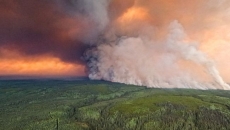The alarm bells are becoming bull horns: Canada's housing supply isn't keeping up with the rapid rate of population growth.
Academics, commercial banks and policy thinkers have all been warning the federal government that the pace of population growth, facilitated by immigration, is making the housing crisis worse.
"The primary cause for (the) housing affordability challenge in Canada is our inability to build more housing that is in line with the increase in population," said Murtaza Haider, a professor of data science and real estate management at Toronto Metropolitan University.
A TD report released in late July also warned that "continuing with a high-growth immigration strategy could widen the housing shortfall by about a half-million units within just two years."
But the Liberals are doubling down on their commitment to bring more people into the country, arguing that Canada needs high immigration to support the economy and build the homes it desperately needs.
"Looking at the (immigration) levels that we have recently approved as a cabinet (and) as a government, we can't afford currently to reduce those numbers," Immigration Minister Marc Miller said in an interview with The Canadian Press.
That's because Canada's aging population risks straining public finances, he said, as health-care needs rise and the tax base shrinks.
A report by Statistics Canada published in April 2022 finds the country's working population has never been older, with more than one in five people close to retirement.
At the same time, Canada's fertility rate hit a record low of 1.4 children per woman in 2020.
The TD report, co-authored by the commercial bank's chief economist Beata Caranci, notes that economists are the ones who have been warning of the economic consequences of Canada's aging population.
"A ramp-up in skilled-based immigration offered a solution. Government policies have delivered, but now the question is whether the sudden swing in population has gone too far, too fast," the report said.
The federal government's latest immigration levels plan, released last fall, would see Canada welcome 500,000 immigrants annually by 2025.
In contrast, the immigration target for 2015 was under 300,000.
Although the half-million figure has caught considerable attention, it's not just higher immigration targets that are driving the surge in population.
Canada is also experiencing a boom in the number of temporary residents who are coming to the country, which includes international students and temporary foreign workers.
In 2022, Canada's population grew by more than one million people, a number that included 607,782 non-permanent residents and 437,180 immigrants.
Miller said in the interview that the federal government is open to reconsidering international student enrolments, particularly amid fraud concerns.
Earlier this year, hundreds of people were suspected of being caught in a fraud scheme that saw immigration agents issue fake acceptance letters to get students into Canada.
"There is fraud across the system that we are going to have to clamp down on," Miller said.
The increased scrutiny of Canada's immigration policies and population growth comes as the country faces a housing affordability crisis caused in large part by a shortage of homes.
Most experts agree that the root causes of this housing shortage are unrelated to immigration. Red tape and anti-development sentiment at the municipal level, for example, can lead to major delays in projects.
Federal tax incentives that helped spur purpose-built rental constructions were rolled back decades ago, leading to a massive shortage in rentals that has slowly built up over time.
Given these existing challenges, experts are concerned strong population growth will add fuel to the fire.
BMO published an analysis in May that estimated that for every one per cent of population growth, housing prices rise by three per cent.
The rebound of the Canadian real estate market this year also shows how immigration is helping to maintain demand for housing, despite decades-high interest rates.
"Strong population growth from immigration is adding both demand and supply to the economy: newcomers are helping to ease the shortage of workers while also boosting consumer spending and adding to demand for housing," the central bank said after raising rates again in July.
Mike Moffatt, a housing expert and economist, said the federal government doesn't necessarily need to change its immigration targets.
"But it does mean that they're going to have to get very bold on housing," said Moffatt, an assistant professor at the Ivey Business School at Western University in London, Ont.
For the federal Liberals, the relationship between population growth and housing prices jeopardizes public support for its immigration policies.
David Coletto, the CEO of Abacus Data, said polling shows Canadians are concerned about the impact immigration is having on the housing market.
"There's a belief, anyways, that on the one hand, immigration is needed because we're an aging population, because ... we need people to do certain types of work that we don't have sort of the domestic capacity for," Coletto said.
"They also see the downside, which is putting further pressure on the housing market and pressure on health care."
Miller said the federal government needs to carefully examine reports on housing and population growth, but he also raised concerns that some of the critiques are motivated by bigotry.
"The wave of populist, opportunist sentiment that does at times want to put all of society's woes on the backs of immigrants — I think we need to call that out when we see it," he said.
Immigration is also part of the solution to the housing crunch, Miller added. Construction is one of the industries where the labour shortage is most critical, and Miller argued that the people who are coming in can help build the new homes that are required to alleviate the crisis.
The federal government recently announced changes to the express entry system that would prioritize tradespeople for permanent residency.
Housing Minister Sean Fraser, who held the immigration portfolio before this summer's cabinet shuffle, said the government is aware of the need to better align its housing and immigration policies.
"The things that we were working towards, that I expect will continue to be advanced under Mr. Miller's watch, is the need to better tie our immigration policies to our housing and infrastructure strategies," Fraser said in an interview.
"It certainly does require some deep thinking to figure out how and where we're going to build the homes and grow the communities in a way that will mirror where people are moving to."






